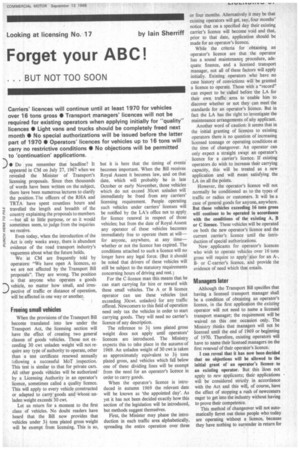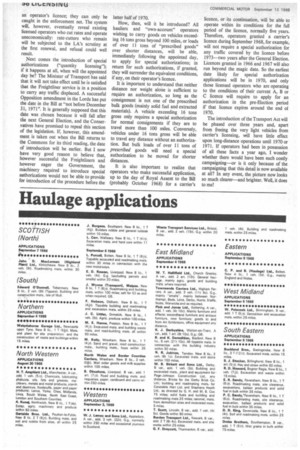or four months. Alternatively it may be that existing operators
Page 99

Page 100

If you've noticed an error in this article please click here to report it so we can fix it.
will get, say, four months' notice that on a specified day their existing carrier's licence will become void and that, prior to that date, application should be made for an operator's licence.
While the criteria for obtaining an operator's licence are that the operator has a sound maintenance procedure, adequate finance, and a licensed transport manager, not all of these factors will apply initially. Existing operators who have no case history of convictions will be granted a licence to operate. Those with a "record" can expect to be called before the LA for their own traffic area to enable him to discover whether or not they can meet the standards for an operator's licence. But in fact the LA has the right to investigate the maintenance arrangements of any applicant.
Another word of caution: it seems that in the initial granting of licences to existing operators there is no question of increasing licensed tonnage or operating conditions at the time of changeover. An operator can only expect a straight swap: an operator's licence for a carrier's licence. If existing operators do wish to increase their carrying capacity, this will be treated as a new application and will mean satisfying the LA On all the points.
However, the operator's licence will not normally be conditioned as to the types of traffic or radius or customers. It will be a case of general goods for anyone, anywhere. But those vehicles exceeding 16 tons gross will continue to be operated in accordance with the conditions of the existing A, B or C licence. These vehicles will be operated on both the new operator's licence and the current carrier's licence until the introduction of special authorizations.
New , applicants for operator's licences who wish to operate vehicles over 16 tons gross will require to apply also for an A-, Bor C-carrier's licence, and provide the evidence of need which that entails.
Managers later Although the Transport Bill specifies that having a licensed transport manager shall be a condition of obtaining an operator's licence, in the first application the existirig operator will not need to name a licensed transport manager; the requirement will be waived on this one occasion only. The Ministry thinks that Managers will not be licensed until the end of 1969 or beginning of 1970. Therefore, existing operators will have to name their licensed managers on the first renewal of their operator's licence.
I can reveal that it has now been decided that no objections will be allowed to the initial grant of an operator's licenceto an existing operator. But this does not apply to new applicants; their applications will be considered strictly in accordance with the Act and this will, of course, have the effect of stopping a rush of newcomers eager to get into the industry without having to prove their competence.
This method of changeover will not automatically ferret out those people who today are operating without a licence, because they have nothing to surrender in return for an operator's licence; they can only be caught in the enforcement net. The system will, however, eventually reveal existing licensed operators who cut rates and operate uneconomically: rate-cutters who remain will be subjected to the LA's scrutiny at the first renewal, and refusal could well result.
Next comes the introduction of special authorizations ("quantity licensing"); if it happens at all, when will the appointed day be? The Minister of Transport has said that it will not take effect until he is satisfied that the Freightliner service is in a position to carry any traffic displaced. A successful Opposition amendment in the Lords has put the date in the Bill at "not before December 31, 1971". It is generally supposed that this date was chosen because it will fall after the next General Election, and the Conservatives have promised to repeal this section of the legislation. If. however, this amendment is taken out when the Bill returns to the Commons for its third reading, the date of introduction will be earlier. But I now have very good reason to believe that, however successful the Freightliners and however eager the Government, the machinery required to introduce special authorizations would not be able to provide for introduction of the procedure before the latter half of 1970.
How, then, will it be introduced? All hauliers and "own-account" operators wishing to carry goods on vehicles exceeding 16 tons gross beyond 100 miles, or loads of over 11 tons of "prescribed goods" over shorter distances, will be able, immediately following the appointed day, to apply for special authorizations; in return for such authorizations, if granted, they will surrender the equivalent conditions, if any, on their operator's licence.
It is important to understand that neither distance nor weight alone is sufficient to require an authorization, so long as the consignment is not one of the prescribed bulk goods (mainly solid fuel and extracted materials). A vehicle exceeding 16 tons gross only requires a special authorization for normal consignments if they are to travel more than 100 miles. Conversely, vehicles under 16 tons gross will be able to travel any distance without an authorization. But bulk loads of over 11 tons of prescribed goods will need a special authorization to be moved for shorter distances.
It is also important to realize that operators who make successful application, up to the day of Royal Assent to the Bill (probably October 1968) for a carrier's licence, or its continuation, will be able to operate within its conditions for the full period of the licence, normally five years. Therefore, operators granted a carrier's licence during September 1968. for example, will not require a special authorization for any traffic covered by the licence before 1973-two years after the General Election. Licences granted in 1966 and 1967 will also run beyond the magic date. So the earliest date likely for special authorization applications will be in 1970, and only those licensed operators who are operating to the conditions of their current A, B or C licence will require to apply for an authorization in the pre-Election period if that licence expires around the end of 1970.
The introduction of the Transport Act will be phased over three years and, apart from freeing the very light vehicles from carrier's licensing, will have little effect upon long-distance operations until 1970 or 1971. If operators had been in possession of all these facts a year ago, I wonder whether there would have been such costly campaigning-or is it only because of the campaigning that this detail is now available at all? In any event, the picture now looks so much clearer-and brighter. Well, it does to me!




































































































































































































































































